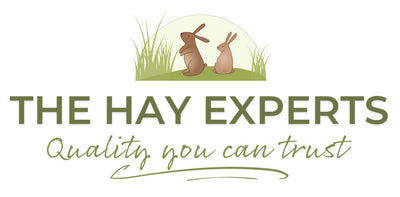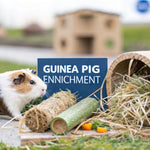Spotting Guinea Pig Vitamin C Deficiency Symptoms
- by The Hay Experts
-

It can be worrying trying to spot the signs of vitamin C deficiency in your guinea pig, but it often starts with small, easily missed changes. Keep an eye out for a rough coat, being hesitant to move, swollen joints, and a drop in appetite. Because they can’t make their own vitamin C, a daily source in their diet isn't just a good idea—it's absolutely essential for their health.
Why Your Guinea Pig Needs Daily Vitamin C

Think about trying to build a solid brick wall without any mortar. It just wouldn't hold together. For a guinea pig, Vitamin C is that mortar; it’s the essential binding agent that keeps their body strong and everything working as it should.
This single nutrient is a true cornerstone of their health, playing a huge part in so many bodily functions. It’s vital for building a robust immune system, helping little scrapes and cuts heal, and maintaining the strength of their teeth and bones. Without enough of it, their whole system starts to struggle.
The Biological Quirk of Cavies
Unlike most other animals, guinea pigs have a unique biological quirk—they simply can't produce their own Vitamin C. This means they are completely reliant on what you put in their food bowl each day to get what they need.
This dependency is why vitamin C deficiency (also known as hypovitaminosis C) is sadly one of the most common nutritional problems we see in pet guinea pigs across the UK. Since they can't make it themselves, it's up to us as owners to provide a reliable supply.
A steady, daily intake of Vitamin C is not just a recommendation; it's a fundamental requirement for your guinea pig's survival and well-being. A lack of this nutrient can lead to a serious and painful condition known as scurvy.
Getting to grips with this core need is the first and most important step any owner can take. It changes daily feeding from just another chore into a powerful, proactive way to ensure a long, happy, and healthy life for your furry friend.
Building the right diet is crucial, and you can explore more advice in our complete guide to guinea pig care to support your pet's overall welfare.
Recognizing Guinea Pig Vitamin C Deficiency Symptoms
Your guinea pig communicates with you through their behaviour, and learning to read those signals is one of the most important parts of being a responsible owner. Spotting the early signs of illness lets you act quickly, preventing suffering and making sure your companion gets the help they need. This is especially true for guinea pig vitamin C deficiency symptoms, which can start subtly before becoming severe.
Knowing the difference between an off day and a genuine health concern is key. The symptoms often begin with small changes you might easily overlook if you're not paying close attention.
This image highlights some of the common signs to look out for when checking on your pet.

As you can see, things like lethargy and a reluctance to move are clear indicators that your guinea pig isn't feeling their best and may be in the early stages of a deficiency.
Early Warning Signs to Watch For
The first signs of a vitamin C shortage often relate to your guinea pig's energy and appearance. Think of it like a mobile phone running low on battery; its performance starts to dip, and it doesn't function as smoothly.
You might notice these initial changes:
- A Rough-Looking Coat: Their usually sleek fur may start to look dull, scruffy, or unkempt.
- Decreased Appetite: They may show less enthusiasm for their food, even turning their nose up at favourite vegetables.
- Reluctance to Move: Your normally active cavy might spend more time huddled in a corner and seem unwilling to run around or play.
- General Lethargy: They just seem tired, weak, or less responsive than usual.
These early symptoms are your pet's first cry for help. Addressing the problem at this stage can prevent it from escalating into something far more serious and painful.
Advanced Symptoms Demanding Urgent Attention
If those early signs are missed, the vitamin C deficiency—known as scurvy—will progress, and the symptoms become much more severe and alarming. At this point, your guinea pig is in significant pain and requires immediate veterinary care.
A guinea pig hopping instead of walking smoothly is a major red flag. This unusual movement, often called "bunny hopping," is a direct result of painful, swollen joints—a classic and advanced sign of scurvy.
The advanced guinea pig vitamin C deficiency symptoms are unmistakable and distressing. They signal a serious breakdown in the body's ability to maintain itself.
Early Warning Signs vs Advanced Symptoms
To help you tell the difference between the first subtle clues and a full-blown emergency, here’s a quick comparison table.
| Symptom Category | Early Warning Signs | Advanced/Severe Symptoms |
|---|---|---|
| Appearance & Coat | Dull, scruffy, unkempt fur. | Significant weight loss. |
| Movement & Energy | Lethargy, reluctance to move or play. | Swollen, painful joints; "bunny hopping". |
| Eating Habits | Reduced appetite, less interest in food. | Bleeding gums, loose teeth, refusal to eat. |
| General Health | Generally looking a bit "off". | Diarrhoea, slow-healing wounds, bleeding under the skin. |
Noticing any of the advanced symptoms means it's time to call the vet right away.
These critical signs include:
- Visibly Swollen or Painful Joints: You may notice swelling around their knees or ankles, and they might cry out when handled or touched.
- Dental Problems: Vitamin C is vital for gum health. A deficiency can lead to bleeding gums and loose teeth, making it incredibly painful to eat.
- Skin and Healing Issues: You might see small bleeds under the skin (petechiae), and minor cuts or scrapes will take much longer to heal. Diarrhoea can also occur.
- Weight Loss: Due to a combination of pain, dental problems, and a general feeling of being unwell, significant weight loss is common.
If you observe any of these advanced symptoms, it is an emergency. Your pet's welfare depends on getting prompt professional treatment to manage their pain and begin reversing the deficiency. While waiting for your vet appointment, ensuring they have easy access to a high-quality fortified feed like Excel Guinea Pig Nuggets or Science Selective Guinea Pig Pellets can provide crucial support.
How Vitamin C Deficiency Happens

The most frustrating thing about vitamin C deficiency is that it's almost always preventable. It rarely develops from a lack of love or care, but from small, honest mistakes in how we feed our guinea pigs. Getting to grips with these root causes is the single best way to make sure your piggy never has to suffer from it.
One of the most frequent culprits is the very thing you trust to keep them healthy: their fortified pellets. You have to think of vitamin C like a delicate flower; it’s fragile and easily spoiled. When guinea pig food is exposed to heat, light, or just sits on a shop shelf for too long, the vitamin C content simply fades away.
This means that even if you're buying a top-quality food, an old bag or one stored poorly in a warm, sunny spot might not be delivering the nutrition you think it is. This invisible loss of potency is a key reason why guinea pig vitamin C deficiency symptoms can sometimes pop up out of the blue.
The Pitfalls of Pellets and Water
The effectiveness of fortified pellets hangs entirely on their freshness and how they've been stored. Research shows that commercial guinea pig food can lose up to 50% of its vitamin C within just three to six months of being made, especially if it gets warm or damp. You can find more insights on this crucial nutrient loss in this detailed veterinary guide.
Another well-meaning but unreliable strategy is adding vitamin C drops to their water bottle. It sounds like a good idea, but this method has a couple of major flaws.
First, vitamin C breaks down incredibly quickly in water and when exposed to light, so the supplement loses its power almost immediately. Second, many guinea pigs hate the taste and will simply drink less water, which can risk dehydration on top of the deficiency.
For these reasons, relying on water drops is a real gamble. The only truly reliable way to get enough vitamin C into your cavy is through a combination of fresh, high-quality food and the right daily supplement.
The Dangers of the Wrong Diet
A critical and surprisingly common mistake is feeding a guinea pig food that's been made for another animal, like a rabbit. Rabbit food has no added vitamin C because, unlike our piggies, rabbits can make their own.
Giving rabbit nuggets to a guinea pig will, without question, lead to a severe and dangerous deficiency. It’s vital to always check that the food you buy is specifically for guinea pigs.
Using a specially formulated supplement, like Science Selective Vitamin C Care Supplement, gives you a reliable, controlled dose. This helps you get the best value from the product by ensuring a consistent intake, directly supporting your pet’s health and preventing painful symptoms from ever developing.
Your Daily Plan to Prevent Deficiency
When it comes to your guinea pig's health, prevention is always the best medicine. Rather than waiting to react to worrying guinea pig vitamin c deficiency symptoms, you can build a simple daily routine that guarantees your furry friend gets everything they need. It’s a small act of care that directly invests in their long-term health and happiness.
A solid prevention plan rests on three pillars: high-quality fortified pellets, an endless supply of fresh hay, and a daily helping of vitamin C-rich fresh veg. Think of this trio as your guinea pig's essential toolkit for a healthy life. Each part plays a specific role, and they all work together to provide complete nutrition and stop deficiency before it can ever start.
The Three Pillars of a Healthy Diet
The foundation of your prevention plan is a balanced, consistent diet. Getting this right means your guinea pig receives a steady supply of vitamin C from multiple sources, ensuring they're always protected.
- Fortified Pellets: Always choose a high-quality pellet food made specifically for guinea pigs. It's crucial to check the "use by" date, as the vitamin C content degrades over time. Storing the food in a cool, dark, and airtight container helps preserve its potency for longer.
- Unlimited Fresh Hay: While not a primary source of vitamin C, unlimited access to high-quality feeding hay is absolutely vital for digestive health. A healthy gut allows your guinea pig to properly absorb all the vital nutrients from their other foods.
- Daily Fresh Vegetables: This is where you can give a powerful, natural boost of vitamin C. A small handful of fresh, safe vegetables each day is a fantastic way to supplement their diet and provide some welcome variety.
A critical part of your daily plan is ensuring your guinea pig receives a high-quality diet.
Powerhouse Vegetables and Smart Supplementing
Not all vegetables are created equal when it comes to vitamin C. Some are absolute nutrient powerhouses that are perfect for daily feeding.
Bell peppers, especially the red and yellow ones, are an excellent choice. They are packed with vitamin C but are relatively low in calcium. Just a slice of bell pepper each day is a simple and effective way to meet your piggy’s needs. Other great options include kale, parsley, and broccoli, though these should be given a bit more sparingly due to their higher calcium content.
To make it easier, here's a quick guide to some of the best food sources you can offer.
Best Daily Vitamin C Food Sources
| Food Item | Vitamin C Content (Approx. mg per cup) | Serving Suggestion |
|---|---|---|
| Bell Pepper (Red) | ~190mg | An excellent daily choice. A slice or two is perfect. |
| Kale | ~80mg | Great source, but feed in moderation due to high calcium. A few times a week is fine. |
| Parsley | ~133mg | A fragrant treat that's high in vitamin C. Offer a few sprigs a few times a week. |
| Broccoli Florets | ~81mg | Good, but can cause gas in some pigs. Give a small floret occasionally. |
| Strawberries | ~85mg | A lovely sweet treat, but high in sugar. Offer one berry as a very occasional treat. |
| Kiwi Fruit | ~167mg | Very high in Vitamin C, but also sugary and acidic. A tiny slice once a week at most. |
This list shows just how easy it can be to add a natural vitamin C boost through fresh foods. Focusing on daily staples like bell pepper gives you a reliable foundation for their diet.
While a balanced diet is always the goal, some situations might call for a bit of extra support. This is particularly true for guinea pigs who are unwell, recovering from illness, or are notoriously picky eaters.
In these cases, a dedicated supplement can offer real peace of mind. Forget about unreliable water drops; using specially formulated, high-fibre tablets provides a controlled and tasty dose. For a dependable way to ensure your pet gets their daily requirement, you can learn more about how our Science Selective Vitamin C Care Supplement can help. This approach ensures your guinea pig receives the exact amount they need, turning a simple treat into a vital part of their preventative healthcare.
Working with Your Vet to Treat a Deficiency
If you even suspect your guinea pig is sick or you're seeing any of the signs we've talked about, your first and most important job is to call a cavy-savvy vet. Getting professional advice isn't just a good idea; it's absolutely vital for your little one's safe recovery. Please, never try to diagnose or treat this on your own.
When you get to the clinic, the vet will give your piggy a thorough but gentle physical exam. They'll carefully check their joints for any swelling or pain, have a look inside their mouth for problems like loose teeth or sore gums, and assess their general condition, from their weight to the health of their coat.
Confirming the Diagnosis
To be certain it's a vitamin C deficiency, your vet will combine what they see in the physical exam with the story you tell them about your pet's symptoms and daily diet. Sometimes, they might also take a blood sample to measure the vitamin C level in the plasma, which gives a clear, scientific picture of what's going on.
The difference can be shocking. One study showed just how dramatically the levels can drop. Healthy guinea pigs had plasma vitamin C levels around 48.17 µmol/L, but deficient piggies had plummeted to just 1.76 µmol/L. If you're interested in the science, you can read more about these findings in the full research on vitamin C deficiency. This kind of data is what helps vets make a confident diagnosis and create a treatment plan that works.
Treatment and Supportive Home Care
Once scurvy is confirmed, the treatment almost always involves giving a high dose of vitamin C supplements. Your vet will prescribe a specific, therapeutic amount, which is much higher than the normal daily dose needed for maintenance.
It is so important that you never try to give high doses of vitamin C yourself. Getting the dose wrong could be useless at best, and at worst, it could cause other health problems. Always follow your vet's exact instructions on how much to give and for how long.
Alongside the medicine from the vet, your role in providing loving, supportive care at home is just as crucial for a smooth recovery. This is where you can make a huge difference.
Your vet might ask you to help with:
- Hand-Feeding: If your guinea pig is in too much pain to eat on their own, you may need to syringe-feed them a special recovery formula. This makes sure they get the calories and nutrients they need to start healing.
- Pain Management: Your vet will likely prescribe pain relief medication to help with the discomfort from their sore, swollen joints.
- Creating a Comfort Zone: Make their living space as cosy and stress-free as you can. A soft bed, quiet surroundings, and making sure fresh food, like our Excel Guinea Pig Nuggets, and water are right next to them so they don’t have to move far. This small change in their environment helps them conserve energy for healing.
Getting prompt vet treatment is the only way to prevent long-term, permanent health issues. Without it, your guinea pig could be left with lifelong joint damage, chronic dental disease, and a much poorer quality of life. By working as a team with your vet, you give your beloved pet the best possible chance to heal completely and get back to their happy, popcorning self.
Got Questions About Guinea Pig Vitamin C? We've Got Answers
Stepping into the world of guinea pig care can feel like you've got a lot to learn, especially about something as vital as vitamin C. Getting to grips with their daily needs is the key to giving them a happy, healthy life. This section is all about answering those common queries that pop up, giving you clear, straightforward information to help you look after your beloved cavy.
Our aim here is to cut through the confusion and give you solid, reliable advice. Once you understand the 'why' behind their care, looking after your pet becomes so much more rewarding.
How Much Vitamin C Does My Guinea Pig Need?
A healthy adult guinea pig generally needs between 10 to 30 mg of vitamin C for every kilogram they weigh, each and every day. This amount is absolutely crucial for keeping all their bodily functions ticking over nicely, from their immune system to the health of their joints.
But that's not a hard and fast rule for everyone. If your piggy is pregnant, nursing, very young, or unwell, their needs will be higher – often up to 50 mg/kg. This is exactly why a well-balanced diet, boosted by a reliable supplement, is so important, especially during these more demanding times. If you're ever unsure, a quick chat with your vet is always the best course of action.
Can a Guinea Pig Have Too Much Vitamin C?
This is a really common question, and it's great that owners are so careful! The good news is that it's incredibly difficult for a guinea pig to "overdose" on vitamin C. Because it's a water-soluble nutrient, any extra that their body doesn't use is simply flushed out in their urine.
Think of it like watering a plant. The plant soaks up what it needs, and the rest just drains away. Your guinea pig's body does something similar; it uses the vitamin C it requires and safely gets rid of the rest. This is why giving them a consistent daily amount is both safe and necessary—their bodies can't hang onto it for later.
What Should I Look For in a Quality Food or Supplement?
Choosing the right products is a direct investment in your pet's health. When you pick out their pellets or supplements, you're actively helping them avoid the painful symptoms of vitamin C deficiency.
Here’s what to keep an eye out for:
- Made for Guinea Pigs: Never be tempted to buy food meant for rabbits or other small animals. Only food made specifically for guinea pigs will have the vitamin C they need added to it.
- Check the "Use By" Date: Vitamin C is a bit fragile and breaks down over time. Always grab the freshest bag you can find to make sure it's as potent as possible.
- Stabilised Vitamin C: Look for this on the packaging. Products using a stabilised form of vitamin C mean the nutrient degrades much more slowly, staying effective for longer.
- High-Fibre Content: A good supplement should also be high in fibre to help with their digestion. It turns a health essential into a genuinely beneficial treat.
When you choose a quality product, you're not just feeding your pet; you're providing a shield against illness. A reliable supplement gives you peace of mind that their core nutritional needs are being met every single day, which is the best way to support their welfare.
How Quickly Will I See an Improvement?
If your guinea pig is getting treatment from a vet for a deficiency, you can often see them bounce back remarkably quickly. With the right high-dose supplements and supportive care, many piggies start showing signs of feeling better within just a few days to a week.
The first things you might notice are them having a bit more energy, being more interested in their food, or moving around more comfortably. More serious issues, like a rough coat or wounds that were slow to heal, will take a little longer to clear up as their body gets to work on repairs. Following your vet’s plan to the letter is the fastest way to get them back on their paws.
At The Hay Experts, we are dedicated to helping you provide the best care for your small animals. We specialise in natural, healthy supplies that support the wellbeing and happiness of your pets, from essential foods to engaging toys.




